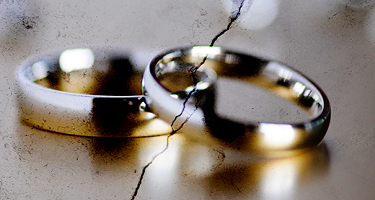The vast majority of states do not require corroboration of divorce grounds under any circumstances, it being sufficient for one or both parties to testify in open court or submit affidavits in support of their grounds for divorce, whether based on fault or no-fault grounds. Only eight states[1] and the District of Columbia require some form of corroboration, but Virginia is the only state where corroboration is required without exception.
- What is Corroboration?
Section 20-99 of the 1950 Code of Virginia, as amended, provides: “(1) No divorce, annulment, or affirmation of a marriage shall be granted on the uncorroborated testimony of the parties or either of them. (2) Whether the defendant answers or not, the cause shall be heard independently of the admissions of either party in the pleadings or otherwise.” Corroboration is defined as “confirmation or support by additional evidence or authority.”[2]
On its face, § 20-99 does not require witness testimony.[3] For example, in the 2015 case of King v. King, the Court of Appeals upheld the husband’s use of a protective order, criminal conviction, and sentencing orders showing that the wife had been found guilty of malicious wounding and use of a firearm in the commission of a felony to corroborate his alleged grounds of cruelty (i.e., that she shot him while he was sleeping).[4] However, there do not appear to be any other appellate cases where a party relied solely on non-witness corroboration to support their alleged fault grounds for divorce.[5]
Similarly, there is only one appellate case addressing a party’s sole reliance on non-witness testimony for corroboration of no-fault grounds for divorce. In Belle v. Belle, the wife argued that the parties’ separate tax filings and her pay stubs and medical bills showing the parties’ separate addresses were sufficient corroboration of her no-fault grounds for divorce.[6] The trial court granted the divorce, but the Court of Appeals reversed, finding that there was insufficient corroboration that the parties had lived without cohabitation continuously for one year, and no corroboration that it was one party’s intent for the separation to be permanent at the time of separation.[7] As a result, the trial court’s equitable distribution, spousal support, and attorney fee awards were vacated, and the parties were forced to start over from the beginning.[8]
Thus, notwithstanding that Va. Code § 20-99 does not expressly require corroboration to be via witness testimony, in practice it is a necessity, at least for no-fault grounds. There are no conceivable ways to successfully corroborate a party’s intent for a separation to be permanent with any form of evidence other than witness testimony; for instance, a journal entry would not satisfy the § 20-99(2) requirement that “the cause shall be heard independently of the admissions of either party in the pleadings or otherwise.” Even if one could conceive of such potential non-witness corroboration of intent, would you be willing to advise your client to test it at trial and risk the outcome in Belle? Probably not.
- Requiring Corroboration of Divorce Grounds is Irrational.
The corroboration requirement was incorporated into the Virginia Code in 1849, when jurisdiction for divorce was first transferred from the legislature to the courts.[9] In the 1871 case of Bailey v. Bailey, the Supreme Court of Virginia explained:
All that was intended by the statute was… to prevent parties who were weary of the bond of matrimony, and impatient of its restraints and obligations, from obtaining the aid of the court through their own collusion and default. It was a rule for the protection of public morals and the sanctity of the marriage relations.[10]
And in the 1952 case of Graves v. Graves, the Court expounded: “The main object of the provision of the statute requiring corroboration is to prevent collusion. Where it is apparent that there is no collusion, the corroboration needs to be only slight.”[11] In the context of divorce, collusion is “an agreement between a husband and wife to commit or to appear to commit an act that is grounds for divorce.”[12]
For 111 years following the institution of the statutory corroboration requirement, Virginia residents could only obtain a divorce on fault grounds; but in 1960 the Virginia General Assembly enacted Va. Code § 20-91(9), allowing spouses to divorce after a period of separation without cohabitation.[13] This “no-fault” ground for divorce inherently permits spouses to “collude” in dissolving their marriage by agreeing to separate; therefore, the concern about collusion has been rendered immaterial.
However, Va. Code § 20-99 has never been amended to reflect this change in public policy—so courts abiding by the rule in Graves (which was cited just this year in the Belle case[14]) must require more rigorous corroboration in no-fault divorces, because those are the cases in which collusion is most likely to occur.
In other words, the public policy rationale behind the corroboration requirement has become illogical. On the one hand, the common law prohibits collusion, but on the other hand, collusion is now endorsed in the form of no-fault divorce.
Virginia residents have no choice but to drag their reluctant family members, friends, and neighbors into the often embarrassing mess that is the dissolution of their marriage. The burden of corroboration is just as much on the innocent bystanders of the marriage—witnesses are being asked to take time off from work to attend ore tenus hearings or appear before a notary public to sign an Affidavit with language they don’t fully understand and sworn statements they feel uncomfortable making. They worry about appearing biased toward one party and damaging their relationship with the other, they’re nervous about testifying in Court, and they’re afraid that swearing under oath to statements that they don’t really know are true may result in a perjury charge or a warrant for their arrest.
Then there are the parties who don’t have any close friends or family members, or they’ve never had guests in their homes—how are they to find acceptable witnesses? Maybe they have teenage or adult children, but they understandably don’t want to get them involved. We’ve all struggled with finding ways to get these clients divorced.
Further, corroborating witnesses in no-fault divorces are asked to provide “evidence” that would often be inadmissible in any other case. When submitting corroborating testimony via affidavit, the witness must verify 1) that the wife is not known to be pregnant from the marriage, 2) that the party is a “domiciliary”[15] of the Commonwealth, 3) that the parties have not cohabited since the date of separation, and 4) that it was the intention of at least one of the parties that the separation be permanent from the date of separation all the way through the date of the witness’s testimony.[16] All of these statements would normally be excluded by reason of speculation and/or the witness’ lack of personal knowledge (unless the witness lived with one of the parties for the duration of their separation and could personally attest that they had not cohabited during that time).
- Corroboration in Other States.
Of the eight states that require some form of corroboration of divorce grounds, Virginia stands alone in requiring corroboration without exception. For example, Maryland recently amended its statute requiring corroboration to provide an exception for the grounds of “voluntary separation.”[17] While the exception is admittedly narrow, it does recognize a separation agreement as sufficient corroboration if the agreement states that the spouses voluntarily agreed to separate and is executed prior to either filing for divorce. Proponents of the new legislation argued that the rule requiring corroborating witnesses is archaic and a needless inconvenience, and that in practice, “it is a charade and everybody in court knows it.”[18] There’s no question that the same reasoning applies in Virginia.
Among the other states requiring corroboration of divorce grounds in limited circumstances, there is no consistent policy or rationale behind the statutory requirements. For instance, in Tennessee and West Virginia, no corroboration is required where the grounds for divorce are “irreconcilable differences.”[19] In Arkansas, corroboration of the grounds for divorce is not necessary where the suit is uncontested and there are fault grounds, and corroboration can be waived by the other party in contested suits where there are fault grounds—but in no-fault cases, there must be corroboration of the parties’ separation and continuity of separation without cohabitation.[20]
In South Carolina, there is no statute addressing corroboration of divorce grounds, but case law has established a requirement. “There is no definite rule as to the degree of corroboration required, but each case must be decided according to its own facts and circumstances… Since the main reason for the rule is to prevent collusion between the parties, the rule is not generally deemed inflexible; and may be relaxed when it is evident that collusion does not exist.”[21] Similar to Arkansas, corroboration in South Carolina has been dispensed with where a party admits the alleged fault grounds.[22]
In Ohio, corroboration of the grounds for divorce is required, but the other spouse may provide the corroboration.[23] In Washington, D.C., a corroborating witness is only required if the defendant is in default, having failed to file an answer to the complaint.[24]
In Rhode Island, the court has the discretion to dispose of the corroboration requirement “whenever the act or acts giving rise to the cause for divorce are of a nature that the complaining party could not ordinarily produce corroborating testimony.”[25] Arguably, a party would not ordinarily be able to produce corroborating testimony of the fact that they have lived separately from their spouse continuously for the three years (required for a no-fault divorce in Arkansas), but the corroboration exception could also apply to the state’s fault ground of impotency.[26]
When examining what constitutes acceptable “corroboration,” there is likewise no consistency or identifiable common policy. In Ohio, the opposing party’s testimony qualifies as corroboration;[27] in South Carolina, party admissions and documentary evidence can both satisfy the corroboration requirement.[28] In Arkansas, corroboration must be provided by a third party witness.[29] In West Virginia and Maryland, corroboration generally requires a third party witness, but the statutes don’t strictly require it—much like in Virginia.[30]
- Conclusion.
Now that all states allow no-fault divorce,[31] the concern about collusion has no rational basis as part of family law policy. No-fault divorce by definition sanctions collusion—spouses can agree to live separately for the statutory period in order to obtain a divorce. Many states have recognized this contradiction and repealed their statutes defining collusion as a defense to divorce.[32]
Those in opposition to eliminating the requirement for corroboration will say that we shouldn’t make it easier to obtain a divorce—that Virginia public policy favors marriage and we need to retain appropriate barriers to dissolution. But requiring estranged spouses to wait the statutorily required six to twelve months before they can file for divorce is itself a barrier, particularly in comparison to the “irreconcilable differences” grounds available in many other states.[33]
If we accept the premise that collusion is no longer a legitimate public policy concern, and hasn’t been since the institution of no-fault divorce in 1960, then the requirement of third party corroboration is nothing more than an arbitrary inconvenience to litigants, and to their friends and family members.
[1] Arkansas, Maryland, Ohio, Rhode Island, South Carolina, Tennessee, Virginia, and West Virginia.
[2] Black’s Law Dictionary, 397 (9th ed. 2009).
[3] See also Forbes v. Forbes, 182 Va. 636, 641 (1944) (“[corroboration] need not rest in the testimony of witnesses but may be furnished by surrounding circumstances adequately established”).
[4] Record No. 2066-14-4 (Va. App., Nov. 24, 2015).
[5] See, e.g., Venable v. Venable, 2 Va. App. 178 (1986) (the wife’s torn pants, in conjunction with the testimony of wife’s mother regarding husband’s violent temper, corroborated the husband’s cruelty); Ibrayeva v. Kublan, Record No. 1120-12-4 (Va. App., Dec. 11, 2012) (photographs of the husband’s injuries corroborated his allegation of the wife’s cruelty when combined with testimony from husband’s mother); Dodge v. Dodge, 2 Va. App. 239 (1986) (the husband’s letter admitting to adultery and the testimony of his former coworker provided the requisite corroboration); Collier v. Collier, 2 Va. App. 125, 128 (1986) (the husband’s note to his wife was considered corroboration of his desertion, together with the testimony of the wife’s sister who “lived nearby and testified about [his] leaving the marital home”).
[6] Record No. 0540-15-2 (Va. App., Jan. 19, 2016).
[7] Id. at 6.
[8] Id.
[9] Bailey v. Bailey, 21 Gratt. 43, 49 (1871).
[10] 21 Gratt. at 50.
[11] 193 Va. at 661-62 (1952).
[12] Black’s Law Dictionary, 300 (9th ed. 2009).
[13] See Todd v. Todd, 202 Va. 133,141 (1960) (“Sec. 20-91, Code 1950, was amended by Acts 1960, ch. 108, p. 121, and now when spouses live separate and apart for three years ‘without any cohabitation and without interruption,’ that constitutes grounds for divorce”).
[14]Supra note 5.
[15] A domiciliary has established a permanent abode in the Commonwealth and has the intent to remain here indefinitely. See Hiles v. Hiles, 164 Va. 131 (1935).
[16] Va. Code § 20-106(B)(8).
[17] See Md. Code, Fam. Law, § 8–104 (effective October 1, 2016).
[18] See Did they spend the night together? Bill would end need for divorce court witness, The Baltimore Sun, February 17, 2016.
[19] See W. Va. Code § 48-5-402 (“No judgment order shall be granted on the uncorroborated testimony of the parties or either of them, except for a proceeding in which the grounds for divorce are irreconcilable differences”); and Tenn. Code § 36-4-103 (“A bill of complaint for divorce…which includes the ground of irreconcilable differences, may be taken as confessed and a final decree entered thereon…without corroborative proof or testimony”).
[20] See Ark. Code § 9-12-306 (“In uncontested divorce suits, corroboration of the plaintiff’s grounds for divorce shall not be necessary or required. In contested suits, corroboration of the injured party’s grounds may be expressly waived in writing by the other spouse. This section…does not apply to proof of separation and continuity of separation without cohabitation, which must be corroborated. In uncontested cases…proof of separation and continuity of separation without cohabitation may be corroborated by either oral testimony or verified affidavit of persons other than the parties.”)
[21] Brown v. Brown, 56 S.E.2d 330, 335 (1949).
[22] See Harvley v. Harvley, 310 S.E.2d 161 (S.C. App., 1983) (holding that “there is no need to corroborate the uncontradicted admission of [the husband] against his own interests” where he admitted the adultery on multiple occasions); and McLaurin v. McLaurin, 363 S.E.2d 110 (S.C. App., 1987) (holding that the husband’s admission to adultery was sufficient corroboration where he contested the suit, which showed there was no collusion).
[23] See Ohio Rules of Civil Procedure 75(M) (“Judgment for divorce, annulment, or legal separation shall not be granted upon the testimony or admission of a party not supported by other credible evidence…The parties, notwithstanding their marital relations, shall be competent to testify in the proceeding to the same extent as other witnesses”); and Patel v. Patel, 11 N.E.3d 800, 806 (Ohio App., 2014) (holding that the corroboration requirement imposed by the civil rule may be satisfied by the testimony of a defendant spouse).
[24] See D.C. Code § 16-919 (“A decree for a divorce, or a decree annulling a marriage, may not be rendered on default, without proof; and an admission contained in the answer of the defendant may not be taken as proof of the facts charged as the ground of the application, but shall be proved by other evidence in all cases”).
[25] See R.I. Statutes § 15-5-5 (“Whenever the act or acts giving rise to the cause for divorce are of a nature that the complaining party could not ordinarily produce corroborating testimony, the court may, in its discretion, if it is satisfied of the existence of the cause in question, the proof in other respects being satisfactory, grant the divorce on the testimony of the complaining party alone.”)
[26] See R.I. Statutes § 15-5-2.
[27] See supra note 23.
[28] See supra note 22.
[29] See supra note 20.
[30] See supra note 19 and Md. Code, Fam. Law § 7-101(b) (“A court may not enter a decree of divorce on the uncorroborated testimony of the party who is seeking the divorce”).
[31] New York was the final state to recognize no-fault divorce in 2010.
[32] See, e.g., N.D. Code § 14-05-12 (repealed, 2001); Colo. Rev. Stat. § 14-10-107(5); Fla. Stat. § 61.044; Mo. Rev. Stat. § 452.310.
[33] See, e.g., Cal. Fam. Code § 2310; 750 Ill. Comp. Stat. 5/306; Miss. Code § 93-5-2; N. H. Rev. Stat. § 458:7-a; N.D. Cent. Code § 14-05-03; S.D. Codified Laws § 25-4-2; Tenn. Code § 36-4-101; W.Va. Code § 48-5-201.
































